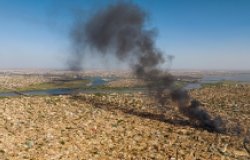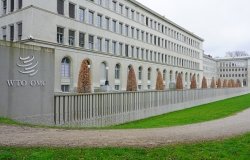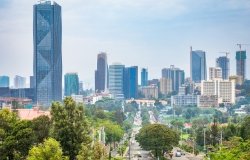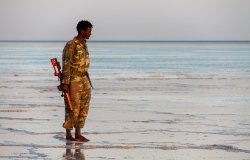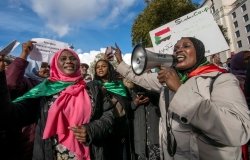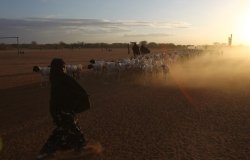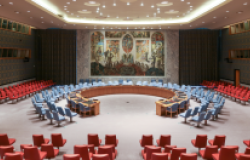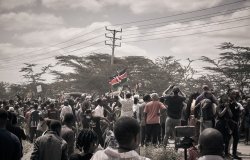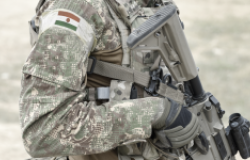
A blog of the Africa Program
A Double Emergency: The COVID-19 Outbreak Exacerbates Humanitarian Crisis in the Democratic Republic of the Congo

The May 7, 2020 United Nations Office for the Coordination of Humanitarian Affairs (OCHA) report on the Democratic Republic of the Congo (DRC) is alarming: "An estimated 12.8 people are in need of humanitarian assistance (…) This figure represents 10 percent of the total worldwide humanitarian caseload. Those affected by this complex and widespread crisis remain exposed to (…) chronic malnutrition and epidemics, notably cholera, measles, and the Ebola virus." The majority of people affected are in the eastern DRC's volatile Kivu region. This situation in Kivu, according to the UN OCHA, is the consequence of a long period of insecurity and the result of continuing fighting between the Congolese Army and non-state armed groups. The region's long-standing fragility and instability are now facilitating the spread of yet another humanitarian emergency in the DRC: the outbreak of the COVID-19 virus. In short, one health emergency (COVID-19) is exacerbating another (Ebola, cholera, and measles).
COVID-19 Spreads in the DRC
The DRC's first case of COVID-19 was detected in Kinshasa, the nation's capital, on March 10, 2020. Shortly thereafter, several regions beyond the capital also reported cases of the disease. In response, the Kinshasa government decided on March 20 to stop all incoming flights from countries at risk and also stop all internal movement of people from Kinshasa to the provinces. These measures momentarily contained the epidemic within Kinshasa. Since then, however, the national COVID-19 numbers are increasing. By May 25, the DRC had reached 2,198 cases, 68 deaths, and 340 recoveries. Among the country's provinces affected by the virus are the conflict zones of North and South Kivu, Ituri, and Nord-Katanga, all located over 2,000 kilometers east of Kinshasa.
The DRC's Deadly Mix of COVID-19, Ebola, Cholera, and Measles
The outbreak of COVID-19 in the DRC puts additional strain on a national healthcare structure that is already heavily burdened by other ongoing epidemics, such as Ebola, cholera, and measles. As a result, the country's COVID-19 outbreak has complicated the national response that was underway against these other epidemics. One month before the first COVID-19 case in the DRC, the United Nations had raised a red flag about the other epidemics then in progress:
"The DRC (…) is affected by epidemics of cholera and measles, in addition to Ebola (…). So while we were concerned only with Ebola in the Beni region of North Kivu, (…) cholera and measles were killing more people in this region. These "two epidemics of which we speak a little less" are also very worrying and deadly (…)."
The outbreak of COVID-19 in the DRC has relegated into the shadows the country's three pre-existing epidemics (Ebola, cholera, and measles). As of May 25, each of the three epidemics had claimed more infections and victims in the DRC than had COVID-19: Ebola accounted for 3,462 cases, 2,084 deaths, and 1,163 recoveries; from January 6 to February 6, cholera accounted for 1,936 cases, while the measles epidemic accounted for 332,000 cases and over 6,200 deaths, of which about 85 percent were children under the age of five.
The COVID-19 pandemic is worsening an already precarious humanitarian situation in the DRC. For example, one current challenge, according to the United Nations International Children's Fund (UNICEF), is to launch a measles vaccination campaign in the Kivu region for at least 150,491 children aged six months to five years while minimizing the transmission of Covid-19.
COVID-19 Could Explode all Across Africa
The COVID-19 crisis in the DRC could become immensely greater, as it could for all of Africa. The World Health Organization's Africa Director, Matshidiso Moeti, warned in a May 7 press conference that, despite the currently low number of COVID-19 cases on the continent, some scientific studies have predicted that "of (…) the one billion population in Africa, 16% to 26% will be infected in the first year, with 29 to 44 million symptomatic cases and 82,735 to 189,579 deaths. There will be an estimated 3.6 to 5.5 million COVID-19 hospitalizations, of which 81,876 to 167,044 would be severe cases requiring oxygen, and another 52,253 to 106,599 would be critical cases requiring more intensive breathing support." Dr. Moeti also noted the studies affirmed that "83,000 to 190,000 people in Africa could die from COVID-19, and 29 to 44 million could be infected in the first year of the pandemic if containment measures fail." Dr. Moeti further asserted that Africa's relatively low COVID-19 transmission rate suggests the continent could experience a more prolonged epidemic over several years: "COVID-19 could become part of our lives in the coming years if many governments in the region do not take a pro-active approach. We have to test, trace, isolate and treat."
A Double Emergency in the DRC
A recent scientific study predicted the DRC's COVID-19 situation may worsen in the near future:
"We simulated a SARS-CoV-2 outbreak in the DRC in the absence of interventions. Using an age-structured epidemiological model (…) and assuming a basic reproductive number of 2.72, (…) we estimate that there would be 76,213,155 infections (…) and 319,441 deaths (…). Given the high prevalence of co-morbidities in the DRC (…), the death toll could even be much higher."
If these COVID-19 projections are accurate, the DRC's already-acute humanitarian crisis would become much more severe. As the DRC's government adopts energy measures to contain the COVID-19 epidemic in Kinshasa, it must also address the multi-epidemiological situation in Kivu. Thus, the current COVID-19 crisis has put the DRC in the middle of a double emergency of COVID-19, in addition to Ebola, cholera, and measles.
Rigobert Minani Bihuzo, S.J., is a Ph.D. candidate at the Catholic University of Paris (Institut Catholique de Paris) and a Research Director with the Centre d'Etudes pour l'Action Sociale (CEPAS), a member organization of the Southern Voices Network for Peacebuilding (SVNP) in the Democratic Republic of the Congo. He was a Southern Voices Network for Peacebuilding (SVNP) Scholar and an Africa Program Scholar during spring 2020.
Photo source: Graphic of COVID-19 outbreak and map of the DRC by Bushko Oleksandr/Shutterstock.
About the Author
Rigobert Minani

Africa Program
The Africa Program works to address the most critical issues facing Africa and US-Africa relations, build mutually beneficial US-Africa relations, and enhance knowledge and understanding about Africa in the United States. The Program achieves its mission through in-depth research and analyses, public discussion, working groups, and briefings that bring together policymakers, practitioners, and subject matter experts to analyze and offer practical options for tackling key challenges in Africa and in US-Africa relations. Read more

